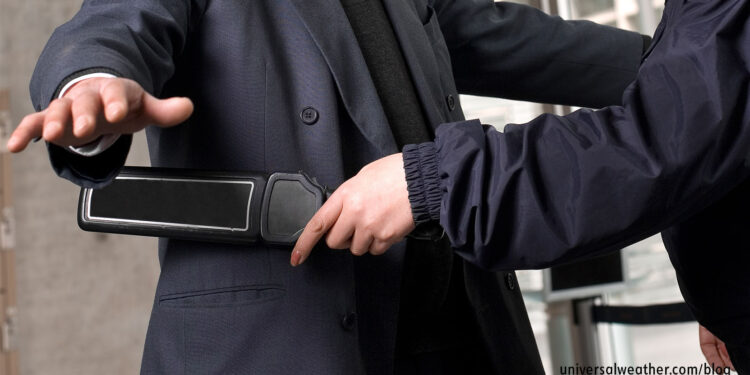Updated Charter Ops Security Screening for Italy – Part 1: New Requirements

This is a post by author Stefano Bruno. Stefano is the station manager for Universal Aviation Italy, which has Fixed-Base Operator (FBO) and ground support locations at Rome (LIRA), Venice (LIPZ), Milan-Linate (LIML), and Milan-Malpensa (LIMC). Stefano is an expert on business aircraft operations in Italy. He can be contacted at stefanobruno@universalaviation.aero
This is part one of a two-article series on new Italian security measures.
Revised security screening procedures have recently been put in place for certain charter (non-scheduled commercial) operations to Italy. While these new requirements are considered temporary, it’s important for charter operators to be aware of new security mandates, as well as associated delays in the customs, immigration, and quarantine arrival process.
The following is an overview of what you need to know:
1. New security requirements
Due to increased terrorism threats worldwide, Italy has established additional security requirements for certain scheduled commercial, air taxi, and charter (non-scheduled commercial) flights. New procedures were put in place January 26, 2015, for scheduled commercial flights and on February 6, 2015, for charter operations. New security requirements apply at all Italian Airports of Entry (AOEs) for charter flights arriving from certain locations outside the European Union (EU) and/or Schengen areas. Note that these mandates are applicable only to international arrivals and do not apply to international or domestic departures. Charter aircraft arriving from within EU or Schengen regions are not impacted by the new requirements. Additionally, private non-revenue operations are not subject to this enhanced screening, no matter where they’re arriving from. Current exemptions for private flights are based on an understanding that operators of private flights are more likely to be familiar with who’s onboard – both passengers and crew members (e.g., less likely to be contracted crew members).
2. New security actions
While there’s an unpublished list of actions, the new security mandate in general includes screening of luggage via X-ray upon arrival, as well as questioning of passengers regarding the purpose of their trip and what they’ll be doing in Italy. In some cases passengers/crew members may undergo enhanced personal inspections, at the discretion of local airport police.
3. Screening process
Screening of arriving international passengers/crews and luggage is accomplished within a general aviation terminal, at the immigration police office at the airport, or in the main terminal. If screening is done within the main terminal, there may be “fast-track” options available for general aviation passengers/crew members. Your ground handler can request fast-track clearance with prior notice, but this will be subject to available airport police resources at time of arrival and the clearance location at the particular airport. New security procedures will be available during all normal airport operating hours.
4. Time involved
It’s expected that these new requirements may add 10-15 minutes to the passenger/crew arrival clearance process. The process could, however, involve 45 minutes or more if airport police choose to more closely inspect a passenger or crew member. For example, if you land with male and female passengers/crew members, and only a male or a female police inspector is available, airport authorities may need to bring in additional, gender-specific, personnel should a decision be made to conduct an enhanced personal inspection.
Having a complete passenger manifest prior to the aircraft’s arrival could help reduce the time needed to bring a male or female inspector in advance for any enhanced personal inspections.
5. New requirements are considered temporary
The reason for enhanced security screening in Italy has to do with terrorism and security-related concerns that have emerged over recent months. The new security procedures are currently temporary; however, they’ll likely be in place for at least the next several months. There isn’t any official guidance yet regarding when these additional security screening steps will be removed.
6. Arrivals subject to screening
Italy’s enhanced security screening program applies to all passengers/crew members from a published list of countries, aboard charter aircraft arrivals into Italy from a non-EU and non-Schengen departure point. Countries of departure covered by the new requirements are as follows:
- Albania
- Algeria
- Armenia
- Azerbaijan
- Belarus
- Bosnia
- Egypt
- Georgia
- Jordan
- Iran
- Kazakhstan
- Kyrgyzstan
- Kosovo
- Lebanon
- Libya
- Mali
- Morocco
- Niger
- Nigeria
- Pakistan
- Russia
- Saudi Arabia
- Syria
- Tunisia
- Turkey
- Turkmenistan
- Uzbekistan
- Yemen
7. Only the previous point of departure is considered
Italian authorities only look at the last departure point, prior to an aircraft’s arrival in Italy, for purposes of enhanced security screening. For example, if an aircraft leaves Kazakhstan, travels to Ireland, and continues to Italy, passengers/crew members will not be subject to new screening requirements upon arrival in Italy. It’s anticipated that police authorities in other EU countries may soon implement their own enhanced security screening procedures for international charter arrivals.
Conclusion
Charter aircraft arriving in Italy directly from certain countries are subject to these new security procedures at all Italian AOEs. Your 3rd-party provider and/or local ground handler will be able to inform you on particular procedures for each airport, as well as options for fast-track clearance or a dedicated clearance lane in the main terminal.
Questions?
If you have any questions about this article or would like assistance planning your next trip to Italy, contact me at stefanobruno@universalaviation.aero.
Stay tuned for Part 2, which covers screening procedures for Italy.




